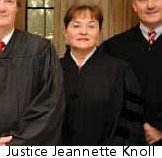10/15/2010
Louisiana Supreme Court Stays Traffic Camera RulingLouisiana Supreme Court takes up the legality of photo enforcement program in New Orleans.

Louisiana's highest court will decide the legality of the red light camera and speed camera program in New Orleans. On Tuesday, state Supreme Court Justice Jeannette Theriot Knoll issued an order staying the preliminary injunction issued October 1 by a district court judge that would have shut down the program (view injunction).
Orleans Parish Civil District Court Judge Paulette R. Irons found that the city violated its own charter by placing the automating ticketing program under the control of the department of public works instead of the police department, which has the sole authority of issuing traffic citations.
"The city argues that 9-201(4) [of the charter] allows the Department of Public Works to issue tickets based upon the department's ability to compile data," Irons ruled. "However, the enforcement of traffic laws requires a judicial determination of probable cause. It requires an opportunity for a hearing where individuals may seek redress before guilt. Nowhere in the ordinance is there an authorization allowing for the Department of Public Works to regulate, enforce and collect monies based upon violations of the law."
A three-judge panel of the state court of appeals agreed, finding no error in the reasoning of Judge Irons. The city blasted both courts for attempting to shut down a program expected to generate $15 million in revenue next year.
"Astonishingly, on October 7, 2010, a panel of the Fourth Circuit chose not to rectify the district court's erroneous ruling," City Attorney Nannette Jolivette-Brown wrote in a brief to the supreme court. "In a brief two-page order, the Fourth Circuit simply adopted the incorrect findings of the trial court, and, in doing so, ignored the clear language of the home rule charter and Louisiana law."
The city argued that its charter allows the Department of Public Works to "perform such other duties as are required by this charter or assigned in writing by the mayor." This, according to the city, represents a blanket grant of authority to allowing the public works department to perform any function.
Irons' order would shut down automated ticketing in The Big Easy. Attorney Edward R. Washington III argued that this would have no impact of safety by citing evidence that cameras tend to cause an increase, not a decrease, in collisions. The city insisted that a purported reduction in violations at camera locations is evidence of the safety purpose. Washington countered that the reduction simply reflects people slamming on the brakes before approaching a speed camera.
With the stay lifted, the city can continue issuing tickets while justices deliberate the camera program's ultimate fate.


